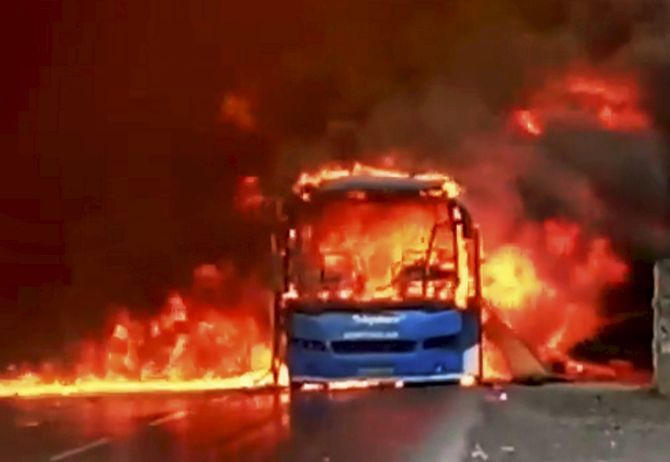Pipliyamandi becomes the epicentre of the current farmers’ agitation across the country, demanding better price for their produce and loan waiver and a political hot-potato for all.

I had told him to not go near the agitators or pelt stones, then why did they kill my young son? He was just running away from the mob,” asks 55-year-old Dinesh Patidar.
A class 12 student, Dinesh’s young son Abhishek was one of the five killed in Tuesday’s police firing against angry farmers demanding better price for their produce, and a loan waiver.
Alongside his education, Abhishek, his father says, was interested in farming. He used to help his father with the farm before Dinesh sold his share of land in February to pay off a bank loan of Rs 5 lakh. “Now I don’t have any debt on me... absolutely no debt,” he says.
Surrounded by well-wishers, fellow farmers, and neighbours in Pipliyamandi near Mandsaur, Dinesh says Abhishek had sustained two bullet wounds -- in his stomach, and shoulder. “Clearly, he wasn’t part of the mob and might have been trying to run when violence broke,” he explains.
Five farmers were killed in police firing in the area on Tuesday after, a nearly week-long, state-wide farmers’ agitation price turned violent. The toll rose to six on Friday after a farmer succumbed to his injuries in Indore.
Just a day before the shooting, Pipliyamandi had seen an altercation between traders and farmers over the enforcement of a state-wide bandh called by the farmers. The altercation snowballed into a fight the next day, with both sides fighting open pitched battles on the streets.
The farmers alleged the local police sided with the traders and opened fire on them, while the district administration says they were forced to retaliate after the lone police station in the area was attacked, and the agitators tried to set a policeman on fire.
“The agitators ransacked a local liquor shop and stole beer bottles. Do you think farmers will drink and make merry when they are fighting for their demand? These were anti-social elements from nearby villages that infiltrated and created trouble,” a senior police officer manning the town’s main thoroughfare said.
He requested not to be identified as he was not authorised to speak to the media.
But locals are not willing to buy this theory.
“Yes, we know the village is surrounded by hamlets where nomads and Bedouins live who don’t have good reputation. But, how just a day before the firing, the wife of a local trader told a farmers’ son to wait for a few days, as all of them would have to buy ‘shrouds’ from the traders. Doesn’t this indicate the killing was pre-planned,” says Anuj Goswami, who owns a two-acre farmland near the village and had come to express grief.
The Madhya Pradesh government has ordered a high-level probe to ascertain the truth.
But locals said the unease between traders and farmers in Pipliyamandi was not just because of the enforcement of the bandh, but was part of a larger problem of the latter feeling cheated due to dipping price of farm produce, mainly soybean, grown by over 90 per cent of farmers in the area.
“Till a few years back, these traders bought soybean from us at over Rs 4,000 per quintal, but since last year they are not willing to pay us even Rs 2,500, while the same is sold at higher prices to oil companies. How are we expected to make our ends meet when the basic price of soy seed is more than Rs 4,500 per quintal,” asks Phoolchand of Khatikhedi village, who owns one hectare of land and has been farming for long.
The agitation and the subsequent firing have put the village under the limelight with a slew of leaders, including Congress Vice President Rahul Gandhi trying to meet the victims, before being stopped by the local administration. Politically, the village is dominated by people from the Patidar community who have traditionally been BJP supporters.
“We have made five demands to the administration, some of which have been accepted. These include a comprehensive farm loan waiver for farmers, a thorough investigation into causes of Tuesday’s police firing, action against local policemen and district administration, withdrawal of all fake cases against farmers, jobs for the kin and declaring the dead as ‘kisan shaheed’ (martyr),” Krishna Patidar, a local community leader, said.
As Pipliyamandi becomes the epicentre of the current farmers’ agitation across the country, demanding better price for their produce and loan waiver and a political hot-potato for all, for Dinesh and his family comprising two elder sons, wife, and grandparents, the loss is difficult to fulfil.
“Only I know what I have lost, rest all is fine,” he says amid wails of crying women in the adjoining room.
IMAGE: A bus in flames after it was torched by farmers at Bhopal-Indore highway in Dewas.












 © 2025
© 2025